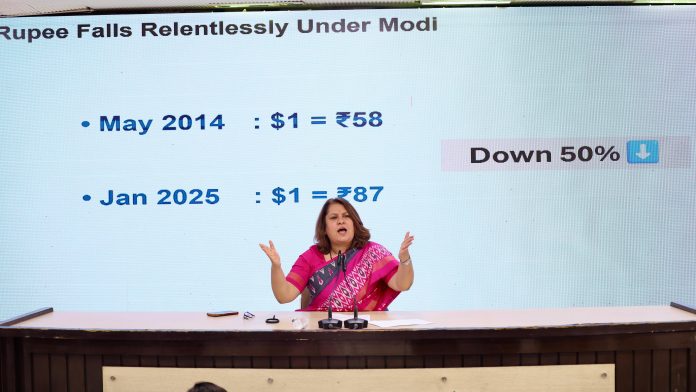– Abdul Bari Masoud
New Delhi: The Congress has criticised Prime Minister Narendra Modi for the sharp depreciation of the Indian rupee against the US dollar. The party highlighted Modi’s past statements, in which he equated the rupee’s fall to a decline in the Prime Minister’s dignity, questioning how he views the current situation.
Addressing a press conference at the AICC headquarters, party spokesperson Supriya Shrinate took a swipe at the Prime Minister, stating, “It seems Narendra Modi is determined to make the rupee hit a century against the dollar.”
She expressed concern over the rupee nearing the 87-mark against the US dollar, emphasising the implications for ordinary citizens.
Shrinate said the falling rupee would increase the cost of imports, triggering inflation and raising the prices of essential commodities. She also revealed that despite the RBI injecting $80 billion since September 2024 to stabilise the rupee, the currency continued its downward spiral. She added that the country’s foreign exchange reserves have dropped to $625 billion, their lowest in 10 months, down from $704 billion in September 2024.
Highlighting historical data, Shrinate compared rupee depreciation across prime ministerial tenures. When Modi assumed office in 2014, the rupee stood at 58 against the dollar. It has since depreciated by over 50%, the highest decline under any Prime Minister since Independence.
By contrast, Jawaharlal Nehru saw a 2% depreciation during his term, while Indira Gandhi oversaw a 5% drop during each of her two terms. Rajiv Gandhi and V.P. Singh both witnessed 6% declines. P.V. Narasimha Rao’s tenure, which involved handling a struggling economy, saw a 17% fall, as did Dr. Manmohan Singh’s government during a period of global economic turbulence. Shrinate asserted that Modi’s government now holds the record with a 34% decline.
Shrinate also contrasted Dr. Singh’s handling of economic challenges, citing the rapid recovery of the rupee during his tenure, when it rebounded from 69 to 58 against the dollar and attracted $35 billion in foreign investment.
The Congress spokesperson warned of the adverse effects of a depreciating rupee on the economy, including increased inflation and a possible hike in RBI interest rates, which could burden citizens with higher EMIs. She questioned the government’s strategy to address the crisis and urged it to take immediate corrective action.




